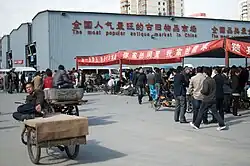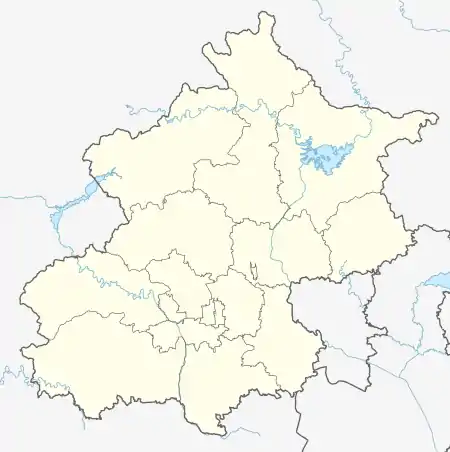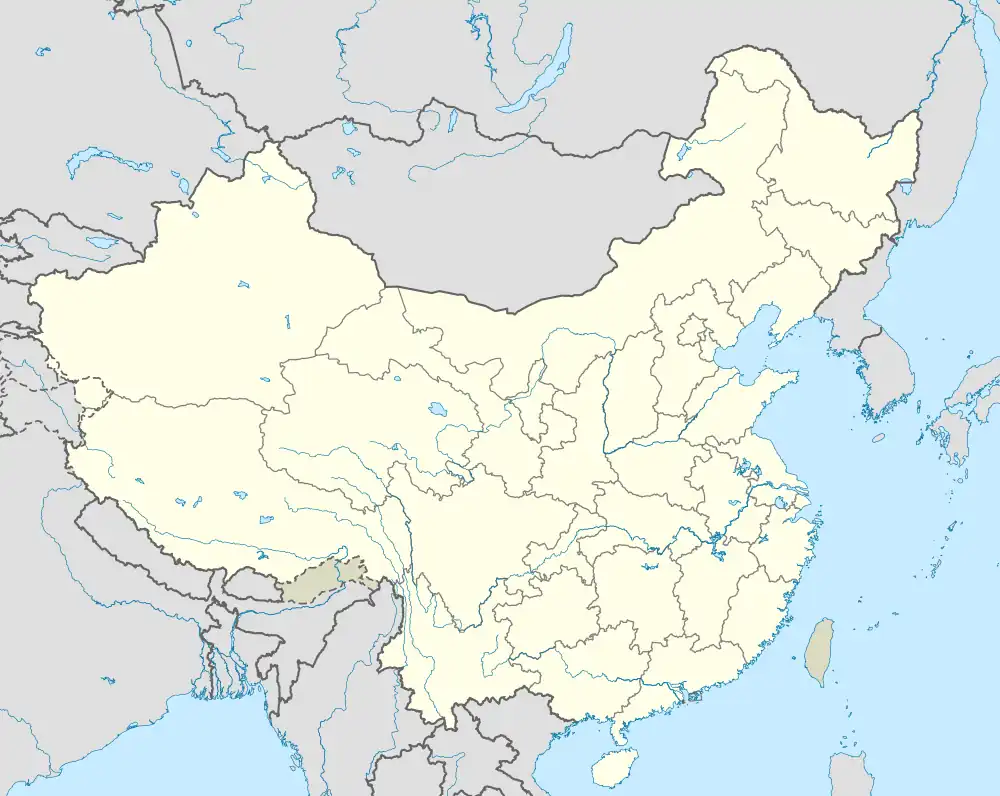Panjiayuan Subdistrict
潘家园街道 | |
|---|---|
 Panjiayuan Market within the subdistrict, 2011 | |
 Panjiayuan Subdistrict  Panjiayuan Subdistrict | |
| Coordinates: 39°52′24″N 116°26′51″E / 39.87333°N 116.44750°E | |
| Country | China |
| Municipality | Beijing |
| District | Chaoyang |
| Village-level Divisions | 14 communities |
| Area | |
| • Total | 4.3 km2 (1.7 sq mi) |
| Population (2020) | |
| • Total | 100,272 |
| • Density | 23,000/km2 (60,000/sq mi) |
| Time zone | UTC+8 (China Standard) |
| Postal code | 100021 |
| Area code | 010 |
Panjiayuan Subdistrict (Chinese: 潘家园街道; pinyin: Pānjiāyuán Jiēdào) is a subdistrict of Chaoyang District, Beijing, China. The Panjiayuan area is located towards the South end of the East 3rd Ring road. It borders Jinsong Subdistrict to the north, Nanmofang Township to the east, Nanmofang and Shibalidian Townships to the south, and Longtan Lake Park of Dongcheng District to the east. Panjiayuan is famous for its flea markets, and as of 2020, it has a population of 100,272.[1]
The subdistrict got its name from Panjiayao (Chinese: 潘家窑; lit. 'Pan Family Ware') Village within the area, which later changed its name to Panjiayuan.[2]
History
Panjiayuan Subdistrict was established in 1984, with 45 residents' committees under its control. In 2000, it was reduced to 12 residents's committees.
Administrative Divisions
As of 2021, there are 14 communities within the subdistrict:[3]
| Administrative Division Code | Community Name in English | Community Name in Simplified Chinese |
|---|---|---|
| 110105018065 | Mofang Nanli | 磨房南里 |
| 110105018066 | Wusheng Dongli | 武圣东里 |
| 110105018067 | Songyu Dongli | 松榆东里 |
| 110105018068 | Songyuli | 松榆里 |
| 110105018069 | Songyu Xili | 松榆西里 |
| 110105018070 | Wusheng Nongguang | 武圣农光 |
| 110105018071 | Huawei Beili | 华威北里 |
| 110105018072 | Panjiayuan Dongli | 潘家园东里 |
| 110105018073 | Huawei Xili | 华威西里 |
| 110105018074 | Panjiayuan | 潘家园 |
| 110105018075 | Panjiayuan Nanli | 潘家园南里 |
| 110105018076 | Huaweili | 华威里 |
| 110105018077 | Songyu Xilibei | 松榆西里北 |
| 110105018078 | Wusheng Xili | 武圣西里 |
Markets
Beijing Antique Market is located at the southwest of Panjiayuan bridge, South road of East third ring road, Chaoyang District, Beijing. Covering an area of 48,500 m2, it is divided into six sections: Roadside stands, Ancient Architecture, Classical Furniture, Modern collection, Sculpture and Stone Engraving, and the Catering section. Trading mostly in antiques, handicrafts, ornaments, and other collectibles, Panjiayuan has an annual revenue of several hundred million yuan. Having more than four thousand shop owners, this market has nearly ten thousand shop assistants in which sixty percent are from the other twenty-eight provinces and municipalities except Beijing. People here come from a variety of backgrounds, there are more than ten minorities of Hui, Man, Miao, Dong, Uighur, Mongolian, Korean, and other ethnic groups of China. Founded in 1992, this market has developed along with the success in business in folk antiques and handicrafts. Diffusing Chinese culture, it has become a large, quaintly classical market of antiques and handicrafts.
Dayanglu Market is one of the largest food markets of Beijing.
See also
References
- ↑ Zhong guo tong ji nian jian = China statistical yearbook. 2020(zong di 39 qi) 2020(No. 39). Guo jia tong ji ju, 国家统计局. (Di 1 ban ed.). Beijing: Zhong guo tong ji chu ban she. 2020. ISBN 978-7-5037-9225-0. OCLC 1262741013.
{{cite book}}: CS1 maint: others (link) - ↑ Zhong hua ren min gong he guo zheng qu da dian. Bei jing shi juan. Li li guo, Li wan jun, Wu shi min, 李立国., 李万钧., 吴世民. Bei jing: Zhong guo she hui chu ban she. 2013. ISBN 978-7-5087-4058-4. OCLC 910451741.
{{cite book}}: CS1 maint: others (link) - ↑ "2021年统计用区划代码和城乡划分代码". www.stats.gov.cn. Retrieved 2022-09-24.